Poor Man's Covered Call Explained

Poor Man's Covered Call Explained
By:Kai Zeng
Also known as a synthetic covered call, the options strategy is ideal for smaller accounts
- For the year, markets are up, implied volatility is down.
- The poor man's covered calls strategy (PMCC) can be a profitable technique, especially in a less volatile stock market.
- PMCC is an efficient use of capital.
The overall market is close to historical highs, resulting in a decrease in overall market implied volatility. In options trading, strategies play a crucial role in maximizing returns and managing risk.
However, with more than 90% of options strategies focusing on volatility selling, the current low implied volatility poses challenges for options traders seeking profits.
Poor man's covered calls (PMCC)
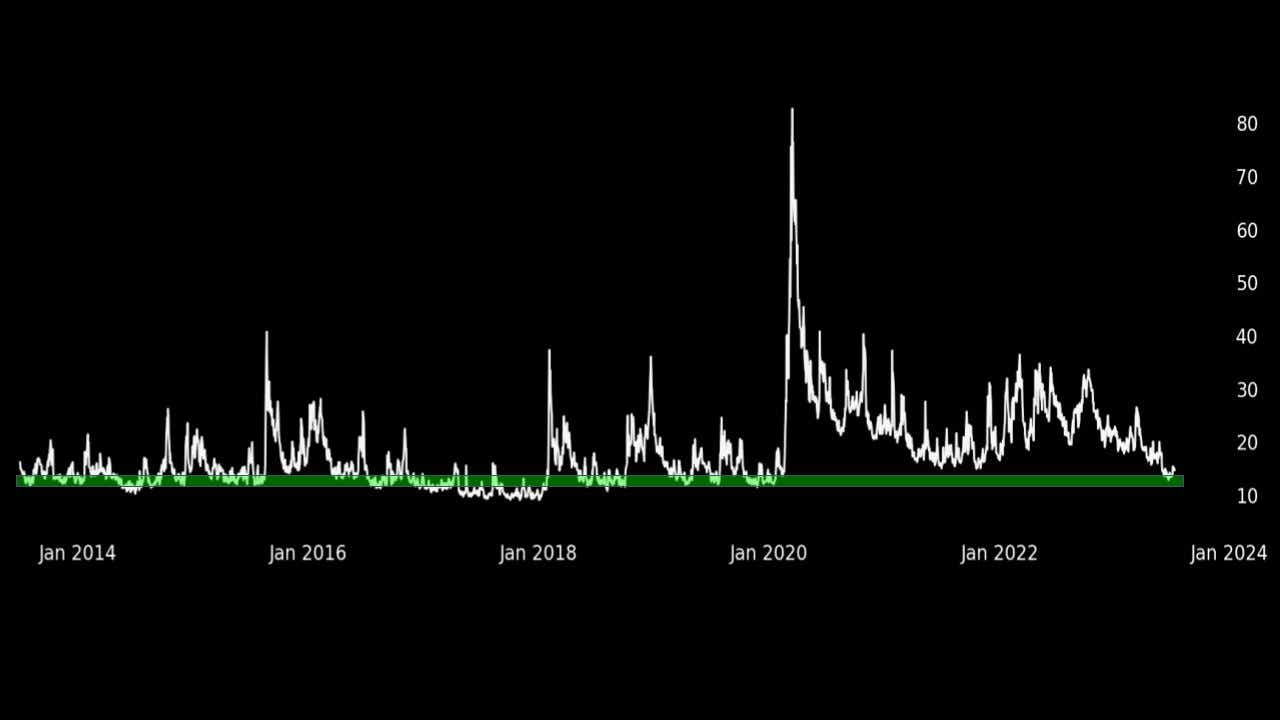
One effective options strategy, particularly in low-volatility market, is known as the "poor man's covered calls" or PMCC. This strategy involves purchasing a long call option with a longer expiration date and then selling a shorter-term option against it.
While this is similar to the traditional covered call strategy, there are some key differences. The PMCC replaces the need for a long stock position in the covered call strategy by using an in-the-money long call option, which reduces the buying power requirement and potentially increases returns on capital.
For those already familiar with the concept of time spread, specifically the diagonal spread, the PMCC is essentially a bullish diagonal spread. Like any time spread, the PMCC is a long-implied volatility strategy that benefits from an increase in implied volatility. One important distinction between time spread and non-time spread strategies is the flexibility to choose different long call expiration cycles.
Optimal durations
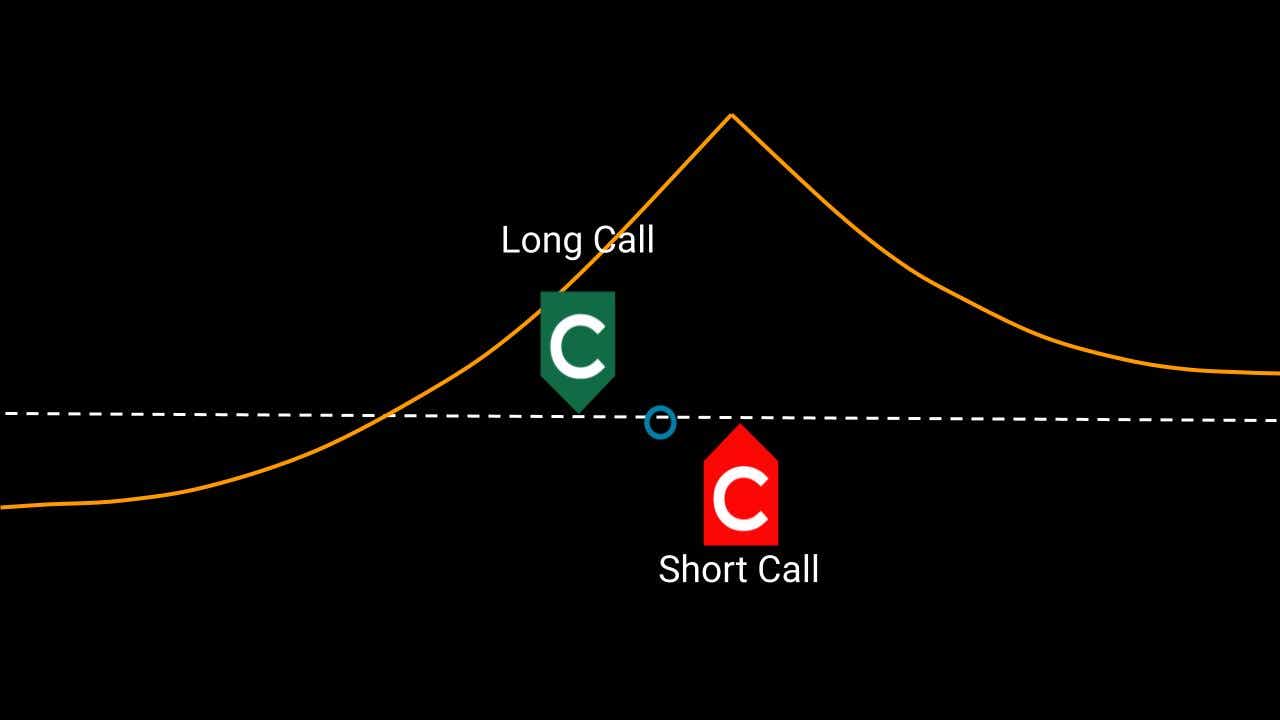
To determine the optimal duration for the long call option in the PMCC, a study was conducted to evaluate the effectiveness of different durations on the SPY (S&P 500 ETF). In the study, a front month, out-of-the-money call option with 45 days-to-expiration and a 30 delta was sold, while a longer-term, in-the-money call option with a 70 delta (to mimic a long stock position) was purchased with varying durations. The results were recorded upon expiration of the front-month option.
A call option with a duration of six months or more behaves more like a stock and is less sensitive to fluctuations in the stock's price. The average profit/loss for each trade is higher for longer expiration positions. However, a call option with a shorter duration, such as 45 to 180 days, requires less buying power and has the potential for higher returns on investment.
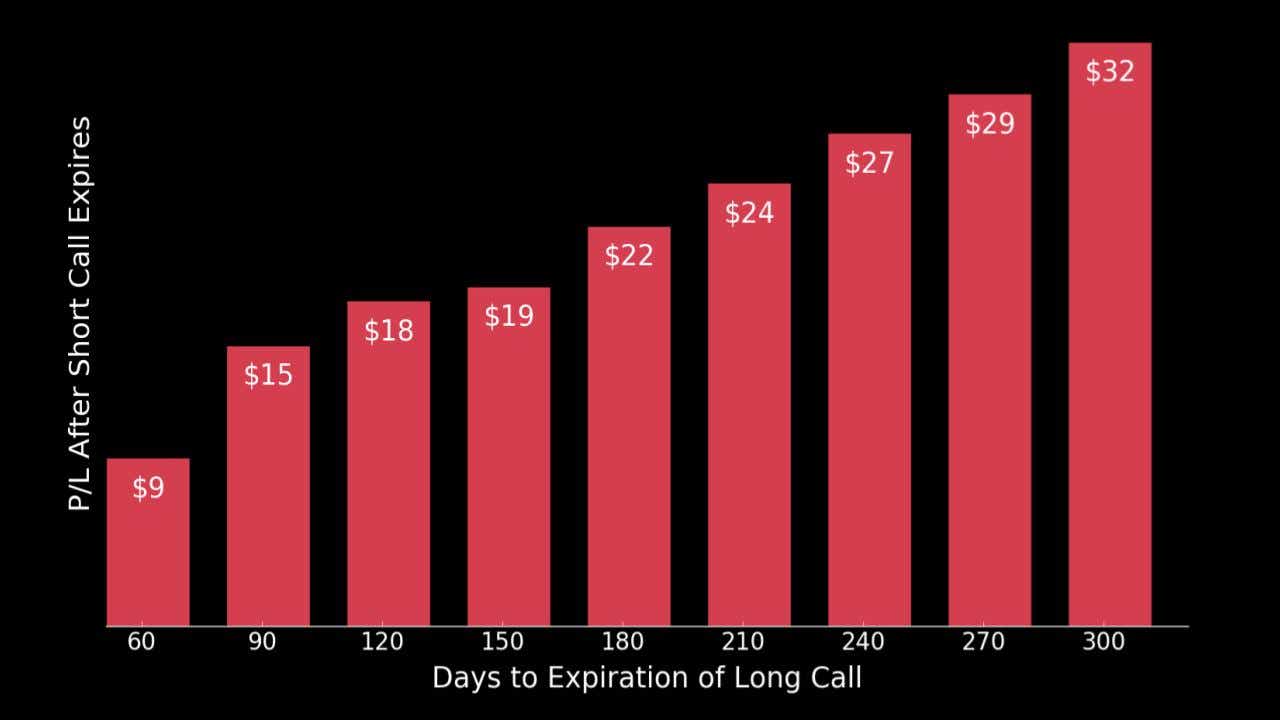
The study showed the success rate only marginally improved with longer-duration calls, suggesting that buying a longer option does not necessarily enhance profitability.
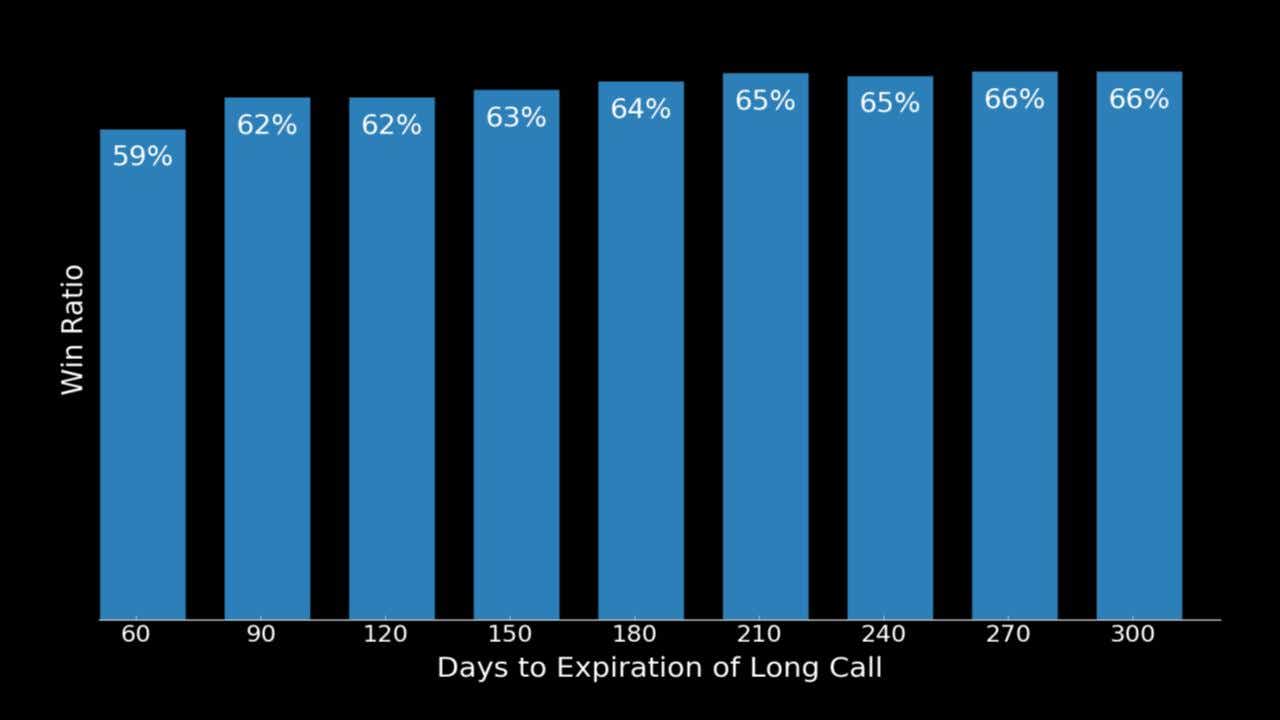
The study revealed the optimal time frame for the long call option in the PMCC strategy is between 90 and 150 days in terms of daily return on capital for each position. This duration not only resulted in high success rates but also reduced the required buying power. This finding is particularly useful for traders looking to optimize their investment strategies.
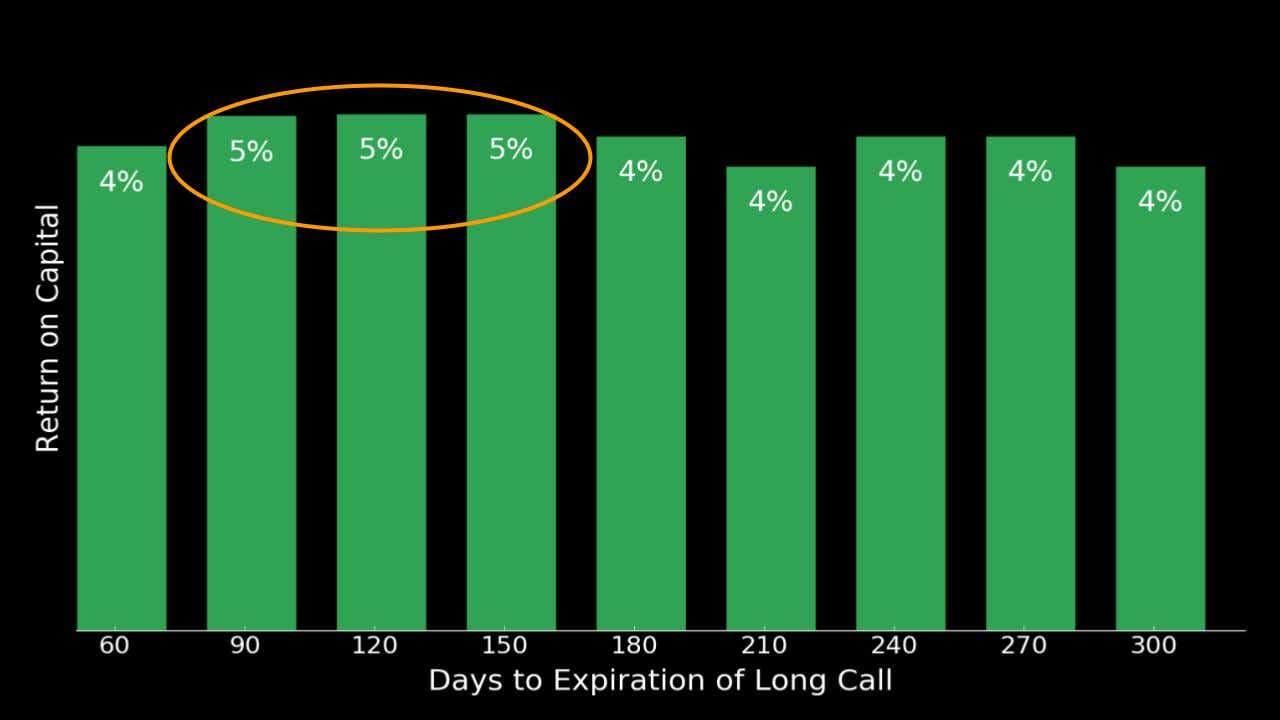
An efficient use of capital
In conclusion, the poor man's covered calls strategy proves to be a profitable technique, especially in a less volatile stock market. By selecting a long call option with a duration between 90 and 150 days, traders can maximize returns while still maintaining a great probability of success.
This strategy is efficient in terms of capital utilization and takes advantage of positive market trends. Whether you are an experienced trader or a novice, incorporating this strategy into your trading toolkit has the potential to enhance your trading outcomes and contribute to your financial success.
For more on the Poor Man's Covered Call, watch the video below.
Kai Zeng, director of the research team and head of Chinese content at tastylive, has a 20-year background in derivatives trading and market experience. He cohosts multiple live shows, including From Theory to Practice and Building Blocks. @kai_zeng1
For live daily programming, market news and commentary, visit tastylive or the YouTube channels tastylive (for options traders), and tastyliveTrending for stocks, futures, forex & macro.
Trade with a better broker, open a tastytrade account today. tastylive, Inc. and tastytrade, Inc. are separate but affiliated companies.
Options involve risk and are not suitable for all investors. Please read Characteristics and Risks of Standardized Options before deciding to invest in options.
tastylive content is created, produced, and provided solely by tastylive, Inc. (“tastylive”) and is for informational and educational purposes only. It is not, nor is it intended to be, trading or investment advice or a recommendation that any security, futures contract, digital asset, other product, transaction, or investment strategy is suitable for any person. Trading securities, futures products, and digital assets involve risk and may result in a loss greater than the original amount invested. tastylive, through its content, financial programming or otherwise, does not provide investment or financial advice or make investment recommendations. Investment information provided may not be appropriate for all investors and is provided without respect to individual investor financial sophistication, financial situation, investing time horizon or risk tolerance. tastylive is not in the business of transacting securities trades, nor does it direct client commodity accounts or give commodity trading advice tailored to any particular client’s situation or investment objectives. Supporting documentation for any claims (including claims made on behalf of options programs), comparisons, statistics, or other technical data, if applicable, will be supplied upon request. tastylive is not a licensed financial adviser, registered investment adviser, or a registered broker-dealer. Options, futures, and futures options are not suitable for all investors. Prior to trading securities, options, futures, or futures options, please read the applicable risk disclosures, including, but not limited to, the Characteristics and Risks of Standardized Options Disclosure and the Futures and Exchange-Traded Options Risk Disclosure found on tastytrade.com/disclosures.
tastytrade, Inc. ("tastytrade”) is a registered broker-dealer and member of FINRA, NFA, and SIPC. tastytrade was previously known as tastyworks, Inc. (“tastyworks”). tastytrade offers self-directed brokerage accounts to its customers. tastytrade does not give financial or trading advice, nor does it make investment recommendations. You alone are responsible for making your investment and trading decisions and for evaluating the merits and risks associated with the use of tastytrade’s systems, services or products. tastytrade is a wholly-owned subsidiary of tastylive, Inc.
tastytrade has entered into a Marketing Agreement with tastylive (“Marketing Agent”) whereby tastytrade pays compensation to Marketing Agent to recommend tastytrade’s brokerage services. The existence of this Marketing Agreement should not be deemed as an endorsement or recommendation of Marketing Agent by tastytrade. tastytrade and Marketing Agent are separate entities with their own products and services. tastylive is the parent company of tastytrade.
tastyfx, LLC (“tastyfx”) is a Commodity Futures Trading Commission (“CFTC”) registered Retail Foreign Exchange Dealer (RFED) and Introducing Broker (IB) and Forex Dealer Member (FDM) of the National Futures Association (“NFA”) (NFA ID 0509630). Leveraged trading in foreign currency or off-exchange products on margin carries significant risk and may not be suitable for all investors. We advise you to carefully consider whether trading is appropriate for you based on your personal circumstances as you may lose more than you invest.
tastycrypto is provided solely by tasty Software Solutions, LLC. tasty Software Solutions, LLC is a separate but affiliate company of tastylive, Inc. Neither tastylive nor any of its affiliates are responsible for the products or services provided by tasty Software Solutions, LLC. Cryptocurrency trading is not suitable for all investors due to the number of risks involved. The value of any cryptocurrency, including digital assets pegged to fiat currency, commodities, or any other asset, may go to zero.
© copyright 2013 - 2026 tastylive, Inc. All Rights Reserved. Applicable portions of the Terms of Use on tastylive.com apply. Reproduction, adaptation, distribution, public display, exhibition for profit, or storage in any electronic storage media in whole or in part is prohibited under penalty of law, provided that you may download tastylive’s podcasts as necessary to view for personal use. tastylive was previously known as tastytrade, Inc. tastylive is a trademark/servicemark owned by tastylive, Inc.
Your privacy choices